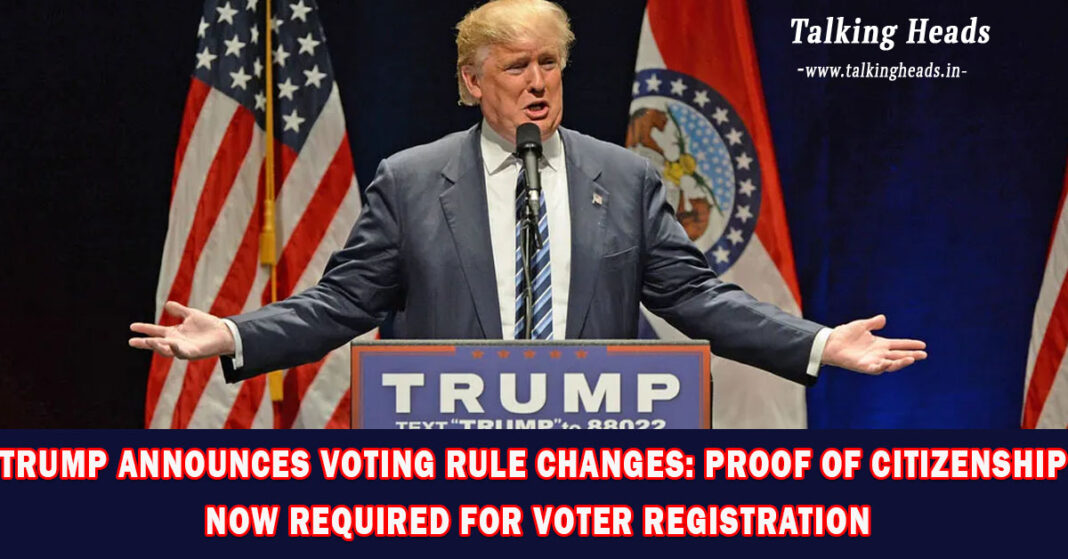In a significant move to overhaul the U.S. voting process, President Donald Trump signed an executive order on Tuesday that mandates proof of citizenship for voter registration. This new rule requires U.S. citizens to provide documentation such as a passport or driver’s license as evidence of their citizenship before they can register to vote.
Table of Contents
The Purpose Behind the Executive Order
According to officials from the Trump administration, this change aims to tighten control over voter lists and prevent the inclusion of illegal immigrants. Currently, many states in the U.S. do not require voters to present documents like a passport or birth certificate to register. This new directive seeks to ensure only eligible citizens are added to the voter rolls.
In previous statements, Trump had cited voter fraud as the reason for his defeat in the 2020 elections, further justifying this policy. However, several states have already prepared to challenge this executive order in court, raising concerns over its potential impact on voting rights.
Trump Criticizes U.S. Voting System
In his order, Trump highlighted that countries like India and Brazil have embraced biometric identification for voters, while the U.S. continues to rely on self-attestation methods. He emphasized the need for the U.S. to modernize its voting system to avoid potential fraud, comparing it to the technological advancements already in place in other nations.
State-by-State Voting Differences and Rules
In the United States, voting regulations differ significantly from state to state. For instance, strict states like Texas, Georgia, and Indiana require voters to show photo identification—such as a driver’s license or passport—before casting their vote. Meanwhile, states like California, New York, and Illinois have more lenient rules, where voters can provide just their name and address or submit a utility bill to vote.
In Michigan, voters are asked to present a photo ID; however, if someone doesn’t have one, they can still vote by signing an affidavit confirming their identity.
What the Executive Order Entails
Trump’s executive order includes four key provisions related to voter registration and election security:
- Proof of Citizenship Required: Voters must provide proof of citizenship, such as a passport or a driver’s license, when registering to vote.
- Collaboration from States: The order urges states to cooperate with the federal government by sharing voter lists and assisting in the investigation of election-related crimes.
- Mail-in Ballots Deadline: Any mail-in ballots received after Election Day will be considered invalid.
- Funding Penalties for Non-Compliance: States that fail to implement these new rules may face reductions in federal funding assistance.
The Ongoing Debate Over Voter ID Laws
The debate over voter identification laws has long been contentious in the United States. While some argue that voter ID requirements help prevent fraud, others claim that these measures disproportionately affect low-income and minority voters, potentially suppressing their participation in elections. This division remains a hot topic of discussion, with both sides presenting compelling arguments.
Restrictions on Foreign Contributions to U.S. Elections
In addition to the voter registration changes, Trump’s executive order imposes strict restrictions on foreign contributions to U.S. elections. Foreign donations have become a controversial issue in recent years, with several high-profile cases drawing attention to the involvement of foreign citizens in American political campaigns.
One notable example is Swiss billionaire Hansjörg Wyss, who has contributed hundreds of millions of dollars to various U.S. causes. Wyss, a known Trump critic, was involved in funding the Sixteen Thirty Fund, which played a role in securing abortion rights in Ohio by donating $3.9 million to support constitutional amendments.
Recently, Kansas also passed a similar bill that prohibits foreign nationals, companies, governments, or political parties from donating to campaigns related to state constitutional amendments, further intensifying the debate over foreign influence in U.S. politics.

Final Thoughts on the Impact of Trump’s Executive Order
President Trump’s executive order represents a bold step in reshaping the U.S. electoral process. While proponents argue that these changes are necessary to ensure electoral integrity, critics contend that the new rules could lead to voter suppression, particularly among marginalized communities. As legal challenges to the order loom, it remains to be seen how this policy will affect future elections and the balance between election security and voter accessibility in the United States.










